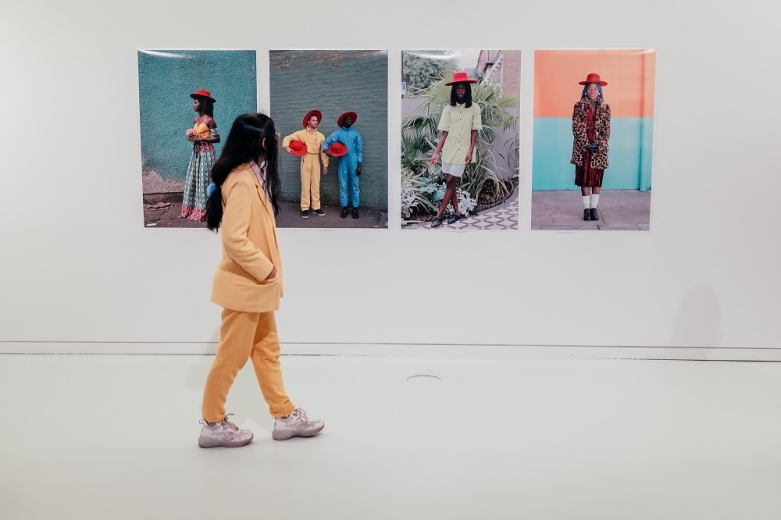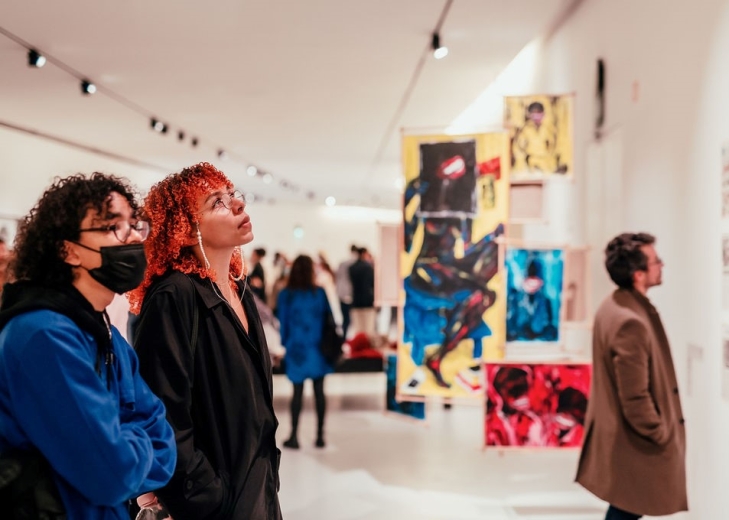
INVISIBLE HISTORIES
With Petra Preta and Puçanga
30/06/2022 – Session 1
IDENTITY
Who are we?"
How important is the Other in affirming my Identity? This question gives the motto for this session where we will reflect on social prejudices. Through a group dynamic, we will take a look at aspects that characterise us, what our local culture is, and how it influences our personal development.
The second moment of the workshop proposes the practice of stencil as a handmade reproduction technique, applied to textiles and paper. With the production of t-shirts and tote bags* we will explore new ways of representing ourselves and thus increase the space for representation.
* You can bring other surfaces/clothes to apply the stencil to.
01/09/2022 – Session 2
HISTORICAL MEMORY
"What do we need to remember?"
Based on the works exhibited at Interferences and the personal narratives of the participants of this workshop, this session aims to work on video and installation formats. Using the mobile phone camera and an editing app, each participant will create a short audio-visual project that questions how historical documents are created. We know that books, newspapers, official documents, and statues make History. And our memories, our lives, can they make it too? How do we get organised and occupy space with our narratives?
The projects created are intended to be projected onto an installation object, which will also be built by the group.
* Participants who do not have a smartphone can still participate but should let the organisation know by sending an e-mail to visitar.maat@edp.pt
Sara Fonseca da Graça (b. 1992), aka Petra.Preta, graduated in Theatre at ESTC, is a multidisciplinary artist and art educator. From her place of speech, she questions herself about identity and social systems problems and the power relations that operate as an inheritance from a colonial past. She began her solo career in painting and illustration with the exhibition Por Uma Natureza das Coisas in São Vicente, Cape Verde. In 2019, Graça created an author's edition printed with the techniques of typography and cyanotype entitled #MÚSICASDOMUNDO. In 2021, she presented the installation Tabanka, from protection to cure in Lisbon and Santarém. In the same year, as part of the All Tomorrow’s Parties residency curated by the SillySeason collective, she presented the performance Solo Status. Petra.Preta participated in the event Kilombo curated by Aurora Negra inaugurating the piece Humor Negro in the venue AlKantara, which is now present in the collective show Interferences at maat. Her most recent work is a video art piece entitled Manchê Bom, part of the Primeiro Rascunho project by Teatro do Bairro Alto. She has co-created Histórias Invisíveis, an educational project supported by CMA, which aims to reflect on the concepts of Identity, Historical Memory, and Human Rights through the Arts.
Vera Marques (b. 1992), aka Puçanga, graduated in Cinema at the Universidade Lusófona de Humanidades e Tecnologias and got her Masters in Cinema: Theory, Aesthetics and Memory at the Université Paris 8, with the thesis "Decolonising: the Tercer Cine, Argentina and the political cinema of a third world in the 1960-70s". She did an exchange course at the UBA - Filosofia e Letras, in Buenos Aires, where she took the Music Composition Course with Ricardo Cappellano from the Manuel de Falla Conservatory and collaborated with CASo (Centro de Arte Sonoro), the Sonido Cinico collective and with the Brazilian artist BEL. In her musical project, Puçanga released the album Fazer da Trip Coração (2021). She is a composer, songwriter, and music producer. She is currently finishing her second EP, to be released soon. She was part of performance projects at Teatro São Luiz and Centro Cultural Gaivotas (Lisbon). Puçanga is also an educator and co-founder of the project Histórias Invisíveis at Miradouro de Alfazina School (Monte da Caparica). Currently, she is developing the project Itinerant Voices – a research platform about the voice, with a free and online programme with singing workshops and talks with several Latin American and Portuguese artists, such as Bruja del Texcoco, Ilessi, Soema Montenegro, Edgar Valente, Diego El Gavi, Carincur, and herself. This edition, with a focus on folklore and experimentalism, was supported by the Ibermúsicas Programme.
